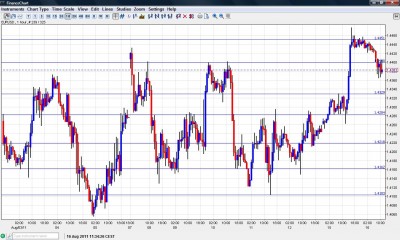Euro dollar slid down from the high range as the German economy almost came to a halt. Expectations are high from today’s summit between Merkel and Sarkozy. Will euro-bonds be announced? Probably not.
Here’s a quick update on technicals, fundamentals and what’s going on in the markets.
EUR/USD Technicals
- Asian session: A quiet session saw the pair steady in high range, above 1.44.
- Current range 1.4325 to 1.44.
- Further levels in both directions: Below 1.4325, 1.4282, 1.4220, 1.4160, 1.4070, 1.4030, 1.3950, 1.3838.
- Above: 1.44, 1.4450, 1.4550, 1.4650, 1.47, 1.4775.
- Yet again, 1.44 proved to be strong resistance.
- The 1.4282 switches positions once again to support. It turns into a pivotal line.
Euro/Dollar sliding lower – click on the graph to enlarge.
EUR/USD Fundamentals
- 6:00 German GDP. Exp. +0.5%. Actual +0.1% – a bitter disappointment.
- 9:00 European GDP. Exp. +0.3%. Actual +0.2%. Not surprising after the German number.
- 9:00 European Trade Balance. Exp. +0.3 billion. Actual -1.6.
- 12:30 US Building Permits. Exp. 610K.
- 12:30 US Housing Starts. Exp. 600K.
- 12:30 US Import Prices. Exp. 0%.
- 13:15 US Industrial Production. Exp. +0.5%.
- 13:15 US Capacity Utilization Rate. Exp. 77%.
* All times are GMT.
For more events later in the week, see the Euro to dollar forecast
EUR/USD Sentiment
- German slowdown: After all the related figures, including PMIs, business confidence and others showed it, the overall figure showed it: Germany’s economy almost came to a full stop, growing only 0.1% in Q2. With the French economy flat, the smaller countries are pushing the wagon, with a moderate rise of 0.2%.
- Merkel-Sarkozy summit: Leaders from France and Germany will meet today to discuss the situation, with tighter fiscal union on the agenda. Reportedly, the Germans lifted their opposition to euro-bonds – a mechanism for sharing debt. They deny it, and the German public and coalition members strictly oppose it. They’ll probably want a stronger governing system in order to share debt. Expectations are high, and a weak message at the end of the summit can send the euro lower.
- Trichet continues guarding periphery bonds: The ECB finally provided the necessary intervention in the markets.. This one is serious. The ECB spent no less than 22 billion euros last week, and plans to drain the money out of the markets. This sterilized intervention is positive for the economy. In the long run, it will be hard to continue with it, and euro printing might be necessary. In the meantime, Spanish and Italian bond yields remain stable at around 5%.
- Spain raises money despite trouble: Spain managed to raise money in 12 and 18 month bonds. This was helped b the calm that Trichet provided. In the meantime, Spain suffers from 50 billion euros of unpaid bills in local authorities and defense contracts worth 26 billion euros that the central government wishes to renegotiate. It cannot pay.
- Italian strike: Italians are upset with the new austerity measures proposed by Berlusconi and Tremonti, especially as they were dictated by the ECB. A general strike awaits the country on August 23rd.
- Bernanke uses verbal tools: As expected, the FOMC left rates unchanged and did not provide any hints about QE3, although some await the Jackson Hole Symposium on August 26 for this. What it did do is pledge to leave interest rates low until mid 2013, despite 3 dissenters. The picture that the committee painted for the US economy was quite gloomy. Stock markets are reacting in a very volatile manner..

